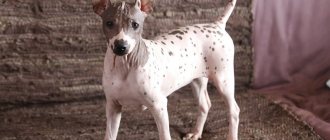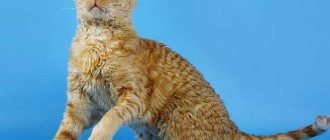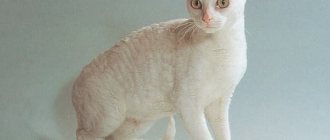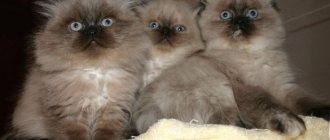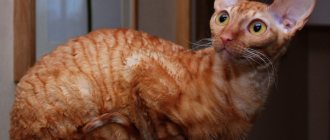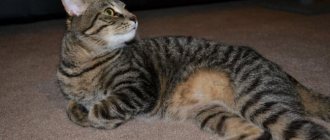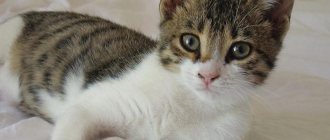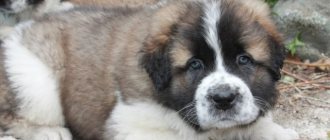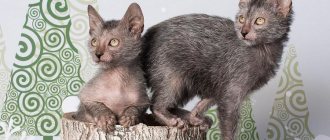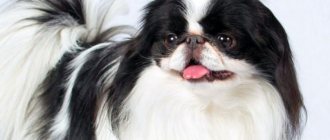Origin story
Devon Rex cats look either like elves from books, or like aliens from distant cosmic worlds.
And the story of their birth is also fraught with mystery. After all, the first cat with huge eyes and curly fur was seen here and there in Devonshire, but no one could catch him. Until one of the local residents, the good-natured Miss Beryl Cox, took in a pregnant cat with a “tortoiseshell” color. One of her kittens was born jet black and had amazingly curly, soft fur. Touched by Miss Cox, she gave him the name “Kirly” - “curly”. At that time, Cornish Rex cats (with “wavy” coats) were at the height of fashion, and Beryl, believing that the kitten had a clearly purebred father, showed the baby to breeder Sterling Webb.
The breeder, not seeing signs of a new breed, decided to cross the animal with her own Cornish Rex to improve its appearance. However, several “matings” clearly showed that it is the unique Kirley genes that give cats curly hair, a triangular head, and large ears. Active breeding work began.
The first standard appeared in 1967, when the breed was recognized by the English felinological organization FIFe. Gradually, it gained recognition from other major world communities, including the American CFA, which until 1979 stubbornly classified the Devon Rex as a Cornish Rex breed.
Representatives of this breed were brought to Russia in the late 90s and quickly began to gain popularity.
The limited gene pool is the main problem of the new breed. Therefore, for its development, it was allowed to cross Devons with Bombay, Siamese and European Shorthair cats (TICA), as well as with American Shorthair and British cats.
Interesting facts about Devon Rex cats
- The first thing that catches your eye when looking at a Devon Rex is its huge, low-set butterfly-wing ears and large almond-shaped eyes. In the dark, these outlines are very reminiscent of a bat or...?
- In old English fairy tales there is a creature called the pixie, which is described as a “sly little blue elf.” The most similar appearance and antics of pixies were depicted in the film about Harry Potter (if you remember the plot about how a flock of pixies caused a commotion during a lesson at school). Those who have ever encountered Devons in real life will agree that there is no other breed of cat so similar to the Pixie, down to the smallest details and habits! Sometimes Devons are called elves, but still elves are more idealized creatures, and Devons, knowing that they will be forgiven for everything in the world, are capable of various cheerful antics. I think that is why the lion's share of owners devoted to this breed are people with a healthy sense of humor (or become so soon after acquiring a Devon!).
- Those who like the idea of the “fairytale” origin of this breed will also like the fact that the first Devonian was found near an abandoned mine in the English county of Devonshire, a side of forests and underground caves. Devonshire, Shire, hobbits, trolls, gnomes, pixies... Devons! They are not the creation of human hands, they are a gift from Nature itself.
- The second feature of this breed is its curly coat. Today, many rex mutations (natural modifications in the structure of the coat) are known, both among cats and among rabbits and domestic mice. Among them is the second English breed of Rex cats - the Cornish Rex, found in another county (Cornwall) and in its appearance not connected in any way with the Devons. In addition to the fact that when mating Devons and Cornish cats, kittens with straight hair are born, the structure of the curl (rexing) is very different.
- Very often we hear from breeders of different cat breeds about the similarity of behavior of their favorite breed with that of a dog. In this case, if we compare the behavior of Devons with the real creatures known to us (since the closest to them are precisely “unreal” creatures, pixies), then this is rather a cross between a bulldog and a small monkey. The similarity with a bulldog is determined by the fact that Devons are quite broad-chested and surprisingly “weighty” cats with a slender, long-legged body and a snub-nosed muzzle (for example, our 8-month-old cat weighs 3.5 kg, and a 3-month-old kitten weighs 1.5 kg), from what determines the nature of their movements and the expression of their faces. And with the monkey - the ability to open any locks and doors with their little hands (talk to the owners of Devons, they will tell you many stories about how Devons overcome any obstacles and get into the most inaccessible places!).
- Girls always find something to do and “invent” toys from everything that comes to hand; our cats can play for hours with an apple stick or a corner of a milk carton... at the same time they happily carry their toys in their teeth and growl at those who trying to encroach on their wealth! And yet, as soon as the opportunity arises to sit on the hands/shoulders/knees of the owner, they will definitely take advantage of it - very often you can see a picture when several Devons try to nest on the laps or hands of a person, usually on each other and, as as a rule, very friendly, without mutual insults and squabbles.
- It is unlikely that there will be many lucky people among us who are able to provide their cats with free range in a comfortable, specially equipped outdoor enclosure... as a rule, most of our cats are forced to coexist with us in small apartments, sharing the hardships of city life. And the owner is forced to put up with the ubiquitous wool and other “toilet” problems, compensating for them with the joy of communicating with a piece of living nature. In this regard, those who decide to buy a Devon Rex cat have a huge advantage - Devon Rex cats do not shed and do not have a specific fur smell! Believe me, it is very convenient and pleasant to have a whole flock of cheerful eared pixies at home and at the same time - calmly wear black (and any other) clothes, do not cover furniture and carpets during shedding, do not catch hairs from food, do not grab a vacuum cleaner when guests in the house, no... and a bunch of other “no’s”!
- There is an opinion that Devons are “hypoallergenic” and they are even recommended for allergy sufferers and asthmatics. It is not true. Devons, like any other breed, can cause allergies and asthma attacks. Simply, due to the structure of their fur, this happens to them much less often and is less pronounced than with other cats.
- In Russia, Devons are still considered a rare breed; not at every exhibition you will be lucky enough to see even one of them! The largest population is traditionally located in Moscow and St. Petersburg, followed by Samara, Belgorod and the southern cities of Russia - Pyatigorsk and Volgodonsk. But the interest in Devons is enormous and, as dry statistics say, the number of Devon litters born is growing exponentially year after year.
Standards
These cats are very compact. The weight of an adult cat does not exceed 4 kg, the weight of a female varies between 2-3 kg.
| Standard | Description |
| Head | Wedge-shaped, small in size, but stretched to the sides, which immediately catches the eye. The chin is massive, as if chopped off at the bottom, the cheeks are rounded, the pads of the mustache protrude. The “stop” is clearly expressed (a stop is a sharp transition from the forehead to the back of the nose). The neck is short, but very graceful. The cheekbones are clearly defined. |
| Eyes | Large, oval, set slightly obliquely and far apart (which gives the cat’s face a frowning and stern expression). The iris can be colored green or yellow (and all shades), but must match the shade of the coat. If the cat has a color point color, the eyes should be blue, if the cat is a mink (Tonkin) color, the eyes should be aquamarine. |
| Ears | Large size, wide. They are planted unusually deep, have a wide base and rounded tips. The inside of the ear is covered with thin and short hair. The presence of small brushes and tassels inside the ears is allowed. |
| Torso | Flexible and graceful. The bones are thin. The chest is wide and massive (this is especially noticeable in males). |
| Paws | Slender, long. The paws are oval-shaped, very small. |
| Tail | Long and thin, with a rounded end. Covered with thin and thick hair. |
| Wool | Soft, short, very pleasant to the touch. It grows abundantly on the muzzle, sides, back and tail, in other places (on the paws, chest, belly and head) it is more sparse and not so dense. There is no cover hair. Babies have shorter fur than adults and often do not form curls. The curl shape is open, the curls grow upward. |
The photo shows a Devon Rex cat
Appearance
Devon Rex cats are characterized by oval paws with small pads, a long and thin pointed tail, elastic, soft and delicate fur that is pleasant to stroke. The average weight of adult cats (males) is from three to five kilograms, females - from two to four.
We invite you to familiarize yourself with: Peculiarities of the appearance, character and maintenance of cats of the Laperm breed
Advantages of the breed:
- Calm character.
- Easy adaptation to new conditions.
- Grace and unusual appearance.
- Good contact with people.
Devon Rex, unlike many other breeds, have a gentle character and love affection and warmth. They are smart and understanding, they get used to the nickname given to them by their owners, quickly responding to it.
Weight by month
Devon Rex weight table by month.
| Weight | Cat | Cat |
| 1 month | 270-610 g | 550-800 gr |
| 2 | 410-820 gr | 930-1500 gr |
| 3 | 1.1-1.4 kg | 1.4-2.4 kg |
| 4 | 1.35-1.8 kg | 1.7-2.7 kg |
| 5 | 1.6-2 kg | 2.1-2.9 kg |
| 6 | 1.7-2.1 kg | 2.2-3.1 kg |
| 8 | 1.85-2.3 kg | 2.5-3.3 kg |
| 10 | 2-2.5 kg | 2.8-3.6 kg |
| 1 year | 2.1-2.8 kg | 3.1-3.8 kg |
| 2 years | 2.3-3 kg | 3.4-4 kg |
Education and physical activity
Devon Rexes are smart and highly intelligent cats. They quickly understand what is required of them and get accustomed to the tray and scratching post without any problems. And if desired and with due persistence, Devon Rex can be trained to fetch and carry out simple commands.
Important. Devon Rexes are distinguished by a violent temperament, which can only be curbed by establishing prohibitions. Therefore, a curly-haired kitten is taught to follow certain rules of behavior from an early age.
To give the Devon Rex the opportunity to throw out accumulated energy, he is given several toys and equipped with a special complex with multi-level shelves and ladders.
Colors
All colors are accepted as the breed is still young. Including thermodependent (acromelanic) options. Cats participating in competitions are grouped by color, and within this group the animal with the brightest and most pleasant color is selected.
The following are considered serious defects leading to exclusion from competitions: strabismus; extra toe; shaggy and long hair; tail with creases. Points are deducted at exhibitions for small, non-standard ears; elongated head; hard coat and short tail.
HAIR AND COLOR OF THE DEVON REX
Devon Rex can be almost any color. The most popular coat colors: black, white, lilac, chocolate, mink, cinnamon, gray, point. Bicolor, tabby and tortoiseshell cats are often found.
- Lilac is a delicate color in which gray and purple tones shimmer with the addition of a pink tint.
- Mink is a mink Siamese (point) color in which the face, ears, limbs and tail are colored. Another feature of this color is the maximum contrast between the shade of the colored parts and the rest of the body.
- Cinnamon (cinnamon, honey) is a color that combines bright red-brown and golden-honey colors.
The breed standard recognizes all existing colors.
Character and behavior
The first impression often turns out to be wrong, and in the situation with Devon Rex this is exactly the case. Locator ears, a non-standard muzzle shape and huge eyes often frighten people who do not understand the breeds, making them think that the cats’ character is also non-standard: capricious, gloomy or even aggressive. But no!
Devon Rexes are extremely sociable and flexible creatures. They are often compared to dogs: in terms of devotion and activity, cats are in no way inferior to the latter!
From a young age to a very old age, Devons remain curious and playful. Pampering is natural for cats: they need to crawl into a closed closet, rustle with an empty bag, test the wires, and ruffle the corner of a pillow they like. From morning to night they run, jump, climb from shelf to shelf, drag their toys from corner to corner. And not just toys, by the way.
If one of your things suddenly gets “lost”, watch your Devon: if he has a hiding place, he will definitely look there during the day. This breed really needs a place to play. It is not necessary to give your cat a separate room, but you should definitely buy and install a cute cat “potty” with ropes and shelves of different heights in the corner. This will allow the animal to lose excess energy and preserve your home environment.
Devons have unusually dexterous and flexible fingers. If other cats take time to open the refrigerator door, then for these pop-eyed babies it’s a matter of five seconds.
Who can't a cat get along with?
With a parrotWith a dog
Tired of games and bored, the Devon will begin to do his second favorite thing: follow on the heels of his beloved owner, trying to help him to the best of his ability and encouraging him with his encouraging meows.
These cats love people extraordinarily and are ready to sit in their arms for hours or, in the literal sense of the word, hang on their shoulders. Devons do not hide their love for people and try to express it in every possible way. Sometimes their obsession even begins to irritate. But under no circumstances scold cats for their love! Devons feel everything very subtly and are very gentle by nature. Loud shouts and rude words will not help, but will only upset your pet: he simply will not understand why you are scolding him.
Expert opinion
Dusheba Vera Ivanovna
In 2010, she graduated from the Moscow State Academy of Veterinary Medicine named after K.I. Scriabin with honors, specializing in veterinary medicine. I regularly attend veterinary conferences, congresses, and webinars.
When choosing an animal for yourself, you should immediately study all the nuances of the breed. A feature of the Devon Rex breed is its inability to tolerate loneliness. A couple of hours a day is all right, but the lack of constant contact with their beloved owner negatively affects their character. Cats withdraw into themselves, become more sullen, and may even get sick.
Devons are not jealous and easily get along with all the other pets living in your apartment. They can easily make friends with both a dog and a cat, but think carefully about a representative of the same breed. Breeders warn: two Devons living in the same apartment will very soon begin to compete for the owner's attention.
The talkative nature of Devons is another feature that not everyone likes. Your cat will purr, meow, and purr all day long, calming down only before going to bed at night. If this annoys you, it’s better to choose a cat of a different breed.
They are very smart, grasping everything on the fly, so you can teach a Devon some commands without much effort. “Come to me”, “Give me”, “Sit” - these are the commands that are easy to explain to the cat through play and with the help of treats.
Devons also love to play with babies, and they do it carefully, understanding what can be done and at what point it is better to step aside.
There are not many disadvantages to Devons. Besides the aforementioned curiosity that can lead to regular clutter, there is something else. This is love to eat properly. Considering that active cats spend a lot of energy, they often have this desire. And in such a situation, they will not sit near the bowl, patiently waiting for the owner to deign to put something there, but they themselves will go looking for food for themselves. Devon will climb into the closet and into the refrigerator, without any problems he will steal a piece from the owner’s plate left unattended, and he will do it so deftly and quickly that he won’t even have time to blink an eye.
During the period of sexual activity, neither males nor females mark territory or yell. Cats are more careful in everyday life than males. In autumn and winter, Devons can freeze, so it is advisable to maintain a comfortable temperature in the apartment, and before going for a walk, dress your pet in a special insulated suit.
A Devon Rex kitten, healthy and with a good pedigree, will cost about 15-30 thousand rubles. It is best to buy it in a nursery, checking the documents and first looking at the baby’s parents (there are large nurseries in Moscow, Samara, St. Petersburg, Yekaterinburg). An animal with physical disabilities will cost significantly less.
When choosing an animal, pay attention to its eyes and ears: they must be clean. The fur is without bald spots. Please note that up to 2 months, kittens have a wavy and thick coat, but from 2 months to six months the hair begins to fall off. Therefore, it is better to book a kitten before 2 months, when you can see it with your own eyes, and pick it up at 3-4 months. By this age, the animal must have received the necessary vaccinations (sometimes castration is also carried out), it is trained to eat and go to the litter tray on its own.
Care and maintenance
Pets do not require special care. You can tidy up their fur using any fine-toothed brush with round plugs on the ends (so as not to scratch the delicate skin when combing). Devons need warmth because their short hair quickly cools their skin. Cats often sleep under a blanket and in the same bed with their owner: experts recommend setting up a warm place for them in advance. Sleep duration is 4-6 hours.
The sebaceous glands of animals work stably, so the fur takes on an unkempt appearance in a short period of time. Cats need to be bathed regularly, otherwise the risk of developing fungal diseases increases. Pets need to have their ears cleaned and their nails trimmed on time (at least once every 7-10 days). Based on the characteristics of the pet’s character (playfulness, activity), veterinarians advise purchasing appropriate toys for the pet in advance or making them yourself.
Devons spend a lot of energy per day, so they need to be provided with proper nutrition. Representatives of this breed eat almost anything: some individuals prefer fresh fruits and vegetables. It is necessary to accustom the animal to the rules of hygiene in advance and explain that it has its own bowl. Devons have a weak digestive system, so it is important to chop and heat food in advance.
The diet should include cereals, vegetables and fresh meat. Fish (only low-fat varieties) is not given often; it is first boiled and all bones are removed. Milk and dairy products can cause intestinal upset, so it is best to avoid them. Experts advise giving preference to poultry (chicken, turkey) and veal. Portions should be small; cats should not be fed pork - it is too heavy. A day - at least 3 feedings.
Care instructions
Wool
Special care for the Devon Rex's fur is not required. A regular brush with natural bristles and periodic combing, coupled with massage, is all that is required of you. However, with wool it is so simple. But the ears, teeth and claws require more attention.
Ears
The erect and large ears of Devons fill with wax and attract dirt quickly, so once a week, clean the ears with a cotton swab dipped in ear lotion (Beaphar Ear Cleaner, Aptus Orisolve, Cliny, Bars) or a fresh warm solution of chamomile.
No hydrogen peroxide or vegetable oil!
Claws
The claws are trimmed once a month with a special nail clipper, and they are also washed in a bowl of soapy water using a brush (to remove fat deposits).
Eyes
Do not touch the eyes unless necessary.
Teeth
Plaque is removed from the teeth with toothpaste for cats, applying it to a special brush or a bandage wrapped around your finger. For prevention, you can give your cat special pads to remove plaque.
Bathing
Devons do not need frequent bathing: only if the cat gets dirty, wash it in a bath with a water temperature no higher than 38 degrees.
In the photo there is a Devon Rex cat on the hunt
How to care for a Devon Rex
Smart and ambitious cats love to clean themselves and lick their wavy fur. But the owner should comb it occasionally, thereby helping the cats clear the entire “furry territory.” The good news is that Devon Rexes do not shed, since there is no guard hair, so you do not have to comb the coat often.
In addition to combing, it is necessary to perform a number of hygiene procedures: bathing (1r/n.), cleaning ears (1r/n.), trimming claws. If cats do not like bathing, then you need to find an approach to them, for example, wipe the kitten with a slightly wet towel for the first days. But the main thing is not to speak loudly to avoid fright, but to gently whisper words of praise. Then calmly wrap it in a diaper and gently wipe until dry. It is important to do bathing in a timely manner, as due to sebaceous secretions on the skin, cats become sticky. It looks like a dirty abandoned animal. In this case, skin diseases cannot be avoided.
You should purchase a special device so that cats can scratch their claws, and not the furniture, owners and guests. In addition, the kit of the scratching post may include both a house and a gymnastics corner. For such temperamental cats, a play corner will be suitable. Otherwise, games will take place on all high cabinets, tables, etc. Before purchasing a Devon Rex, you should prepare the rooms by removing all fragile objects.
Catering
Devons can eat both “natural” and ready-made food, but both options have their own nuances.
Recommended food
Choose industrial feed from the super-premium or holistic lines. These feeds have a balanced composition, an abundance of vitamins and minerals necessary for the full growth and existence of the animal.
Economy class food (and most of the premium food) do not provide any benefit to animals: instead of high-quality meat, they use so-called “meat waste” (and what is hidden under this name is a big question), a lot of preservatives, dyes, and flavor enhancers.
- List of holistic foods: Wildcat, Pronature Holistic, Orijen.
- List of super-premium foods: Brit Care, Arden Grange, Vet Life.
Below are recommended super-premium foods. Links with the names of the food are clickable, on them you can, within our website, get acquainted with the descriptions of the food and read reviews from owners of Devon Rex cats.
| Holistic | Super premium | Super premium |
| Wellness CORE | Duke's Farm | Vigor & Sage |
Natural products
A natural menu should include:
- High-quality lean meat: beef, veal, chicken, rabbit, lamb and turkey (daily);
- By-products: chicken necks, liver, hearts, ventricles (every 2 days);
- Chicken and quail eggs: quail eggs - fresh, chicken eggs are boiled and only the yolk is given;
- Lean sea fish: hake, salmon (no more than once a week). You can pamper your pet with squid and shrimp;
- Fermented milk products: low-fat cottage cheese, sour cream, cream, natural yogurt without additives or dyes, Varenets, cheese, kefir (daily);
- Cereals: buckwheat, millet, oatmeal, rice (daily);
- Vegetables: carrots, zucchini, pumpkin, green beans, green salad (daily);
- Vegetable or olive oil (a few drops in porridge every day).
- Sprouted wheat or oats.
Your pet's bowl should always be filled with fresh and clean water: bottled or settled. Bowls should be washed daily, the water should be changed 2 times a day: morning and evening.
It is prohibited to include in the diet:
- Fatty meat (pork, goose, duck);
- Offal, bones, lard, skin;
- Fermented milk products with preservatives and dyes;
- Juices, carbonated and mineral water, alcohol, tea, coffee, cocoa;
- River fish;
- Sausage, frankfurters, small sausages;
- Smoked meats, human canned food;
- Flour, baked goods, sweet, salty;
- Eggplants, grapes, avocados, white cabbage, chickpeas, peas, garlic, onions, potatoes, mushrooms;
- Spices, sauces, mayonnaise, seasonings.
Adult healthy cats are fed 2 times a day, cats aged 4-6 months - 3-4 times a day; kittens 2-3 months – 5-6 times. Food is given at a comfortable temperature, neither hot nor cold.
Pictured are kittens of the Devon Rex breed
Devon Rexes are lactose intolerant, so milk is also prohibited. Raw liver is not digestible: it must be stewed or boiled.
Features of feeding and diet
Devon Rex should be fed only with professional food - you should not buy economy-class food, this will harm the pet. Also, you shouldn’t think about eating “from the table”, since choosing a good diet is quite difficult.
If you still decide to prepare food for your pet yourself, then the diet must include: meat, lean fish, cereals, vegetables, dairy products (with a reduced percentage of fat).
You should remove from the diet: chocolate, fruits, milk, liver, spicy and spicy foods, legumes, potatoes, baked goods.
It is better to give meat and minced meat not boiled, but scalded, in pieces of 100-150 grams. Occasionally it is worth pampering your pet with lightly salted cheese or eggs.
Before creating a diet, you should consult with a veterinarian and, based on your pet’s health, create an individual menu or choose the most suitable food.
Diseases
The Devon Rex breed can be called quite healthy, but some diseases threaten them too. For example, this is hypertrophic cardiomyopathy - a disease of the heart muscle that can manifest itself in both young and old age. It cannot be cured, but you can significantly improve your pet’s quality of life if you consult a veterinarian in time and follow all his recommendations.
Another ailment is a dislocated kneecap. This can be caused by a birth defect or physical injury. In particularly severe cases, surgery is required.
Malassezia dermatitis is an unpleasant fungal disease that begins against a background of weakened immunity or allergic reactions. It can be cured.
Myopathy is a hereditary disease that causes kittens to be unable to swallow or hold their head up. The offspring die at a young age, but nowadays such a disease is rare (breeders monitor and do not allow parents to further reproduce).
Incompatibility of blood groups, namely A and B, in mother and offspring. Maternal antibodies destroy red blood cells in kittens, transmitted through milk. Babies must be artificially fed from the very first days of life.
HEALTH AND DISEASES OF THE DEVON REX
The Devon Rex is a pet with good immunity. A healthy animal does not shed, is active, and its eyes and nose remain clean.
However, there are diseases to which Devons are more susceptible than others. It is a myopathy that causes muscle dysfunction, airway obstruction, joint problems (hereditary) and cardiomyopathy. Unfortunately, most genetic diseases are diagnosed in adulthood and are difficult to treat.
In addition to hereditary diseases of the Devon Rex, which are transmitted along the genetic line and are quite rare, there are also acquired ones. Due to an incorrect lifestyle, problems with digestion, teeth, excess weight, kidneys and bladder may appear. In unsterilized females, in the absence of regular matings, endocrine, oncological and gynecological diseases can develop.
Advantages and disadvantages
- Calm disposition.
- They are not afraid of water.
- Friendly attitude towards children and guests.
- Playfulness.
- Intelligence.
- Ability to train.
- They don't bite.
- Minimal amount of fur during shedding.
- Good health with proper care.
- Strong dependence on the owner.
- Excessive activity and curiosity. Perhaps for some this will not seem like a disadvantage.
- Dietary requirements.
- Very high price. Depending on the pedigree, it ranges from $220 to $750.
Owner reviews
Vasily, Kostroma: “I can say that the Devon Rex is one of the most amazing breeds. Cats are friendly, loving and very affectionate! They love order and don’t mess up the house.”
We invite you to familiarize yourself with: Beef breeds of cattle, market pricing policy
Mila, Ternopil: “Amazing creatures that everyone who wants to have them will love! I like Devons because they are distinguished by their affectionateness, playfulness and the fact that they like to respond only to their nickname.”
Kostya, St. Petersburg: “They love people, they don’t mind being naughty. They are not vindictive. Devon is a playful little miracle that our whole family loves!”
Albert, California: “To get yourself a Devon, you need to provide him with careful treatment and good living conditions in which he will feel comfortable. Previously, I always kept British cats, but then I realized that this was not for me after acquiring a wonderful girl.”
Heinrich, Netherlands: “Most Devons are very affectionate and even sticky, and they are also curious and love a clean house.”
Feeding
The preferred food for Devon Rex is premium and higher. Such cats are bred in large nurseries that have a reputation and weight, so most often dry professional mixtures and feeds are used as food. Natural feeding is acceptable, but is used quite rarely due to the difficulty of achieving a balance of nutrients.
When buying a kitten, find out what kind of food he eats, and do not switch to another brand of food in the first weeks. If you are not satisfied with the food, gradually switch the animal to another type of food. A sudden change in food can cause digestive upset.
With natural feeding, it is advisable to give meat (without fat), offal, milk, vegetables and cereals. Under no circumstances should you salt or pepper your food. Fish is not advisable.
Where can I buy?
There are many possible options for purchasing kittens. Buy kittens or adult cats, both from private individuals and directly from nurseries. Cats with pedigrees will cost you more, but this will give you confidence that they do not have health problems. There is also the option of purchasing cats on the bulletin boards of local city portals or the opportunity to take them into good hands.
https://devonrex.su/index_1.php - Elende;
Estrus and mating of Devon Rex
Estrus occurs between 4 and 6 months and occurs three times a year. Thanks to good health, pregnancy and childbirth occur without complications and do not require intervention. Rexes are excellent parents. There are frequent cases when two cats living together organized a kind of kindergarten for their children, raising them together.
Breeding of Devon Rex with other breeds is prohibited. If you decide to breed this breed, you should be very careful when choosing a manufacturer - in our country there are few representatives of the breed with a good pedigree.
But there are a number of difficulties in obtaining offspring even within the breed. The fact is that in the Devon Rex breed there are cats with both blood group A and group B. When mating a cat and a cat with different blood groups, a Rh conflict may arise. But, unlike in humans, it does not appear during pregnancy, but during breastfeeding. Antibodies are released through colostrum, and kittens with the opposite blood type may die due to Rh conflict. Therefore, breeders use two methods: either they determine the blood type of cats and match only those that are suitable to each other, which is quite difficult and expensive, or they simply make adjustments to the feeding of kittens. The critical content of antibodies is contained only in colostrum, so it is enough to take the kittens away from their mother for the first 1-2 days, artificially feeding them, and then return them. After this time, mother's milk is no longer dangerous for kittens with the opposite blood type.
Pregnancy and Devon Rex kittens
Devon Rex kittens are born with completely straight fur, which subsequently begins to curl into characteristic waves. Babies open their eyes record-breakingly quickly – already on the 3-5th day.
The first day after birth, kittens are fed with a special formula that replaces mother's milk. Then they give it back to her, and for a while you can forget about nutrition problems. But as early as a month it is necessary to introduce supplementary feeding. It is important that the selected food is slightly soaked in water, and that the natural food is slightly heated and highly crushed.
Grown-up kittens (at the age of six months) need to be fed less often - 3 times a day, and older animals (at 10 months) should be switched to an adult, twice-a-day diet.
The cost of “elven” kittens is record high. This is due to the small number of breeding cats in our country, the high cost of caring for kittens, the difficulty of selecting animals for mating and many other factors. Before buying a kitten, carefully check the pedigree of its parents, participation in exhibitions, the reliability of the nursery and the living conditions of the animals.
The price of a kitten starts from 10 thousand rubles and ends at 30 thousand or more. You cannot buy a Devon Rex cat on Avito or other auctions. Such animals most often have significant defects or have nothing in common with this breed at all. Fraudsters take advantage of those who want to buy a rare pet at an affordable price by passing off mixed breeds as purebred kittens. But even despite the high costs, the number of people wishing to purchase a wonderful eared baby is increasing every year.
